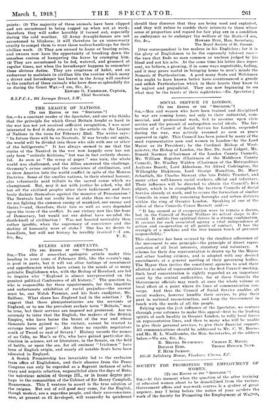RULERS AND SERVANTS.
(To THE Emcee or me "Strzersres."1 Sia,—The able if somewhat apologetic article under this heading in your issue of February 15th, like the curate's egg, is good in parts, but it. will not allay feelings of resentment and apprehension which have arisen in the minds of no many patriotic Englishmen who, with the Bishop of Hereford, are led to inquire why "England is almost unrepresented on the greatest political Conference of all history." The question is, who is responsible for these appointments, for this impolitic and unfortunate exhibition of racial prejudice—the answer must be, our Welsh Premier, and his Scots coadjutor. Mr. Balfour. What share has England bad in the selection ? To suggest that these plenipotentiaries are the servants of England, or to use the prevalent archaic term "Britain," may be true, but their services are imposed not preferred. Are we seriously to infer that the English, the makers of the British Empire, who have borne the brunt of the war and whose Generals have gained us the victory, cannot be trusted to arrange terms of peace! Are there no capable negotiators south of Tweed or east of Severn ? History records the names of no Celts, no Mac's or O's, who have gained particular dig tinction in science, art or literature, in the Senate, on the field of battle, or upon the sea, for all eminent "Irishmen" have been of English origin, and nearly alt notable Scots have been educated in England.
A Scotch Premiership has invariably led to the exclusion from office of Englishmen. and their absence from the Peace Congress can only bo regarded as a flagrant instance of arbi- trary and nepotic selection, unparalleled since the days of Bute, the notorious minion of George III., or in lesser degree per- haps in the composition of the Cabinet of Sir Henry Campbell. Bannerman. This I venture to assert is the true solution of the enigma. But out of evil good may come, for the English, though modest, are a superfine people. and their race-conscious. ness, at present-so ill developed, will assuredly be quickened should they discover that they are being used and exploited, and they will refuse to confide their interests to those whose sense of proportion and regard for fair play are in a condition so embryonic as to endanger the welfare of the State—I am,
Sir, &c., HOWARD REEF, HOD. Secretary,
The Royal Society of St. George.
[Our correspondent is too zealous in his Englishry; for it is the glory of Englishmen to be the supremely tolerant race— the race that finds no man common or unclean judged by his blood and not his acts. At the some time his letter does repre- sent, we believe, a growing, if in some ways regrettable, feeling. and it may prove useful in bringing home to men's minds the Nemesis of Particularism. A good many Scots and Welshmen who ought to have known better have countenanced a greedy and selfish Particularism which in their hearts they know to be unjust and prejudicial. They are now beginning to see what may be the fruits of their sophistries.—En. Spectator.]


































 Previous page
Previous page